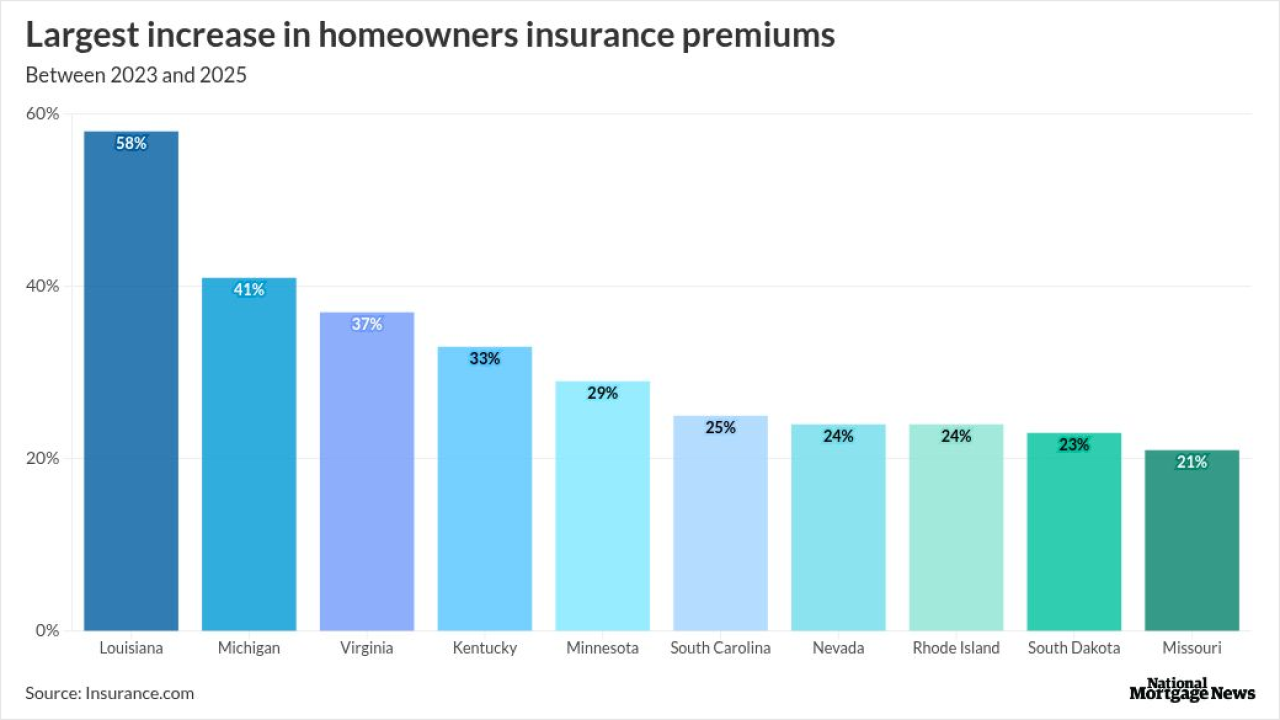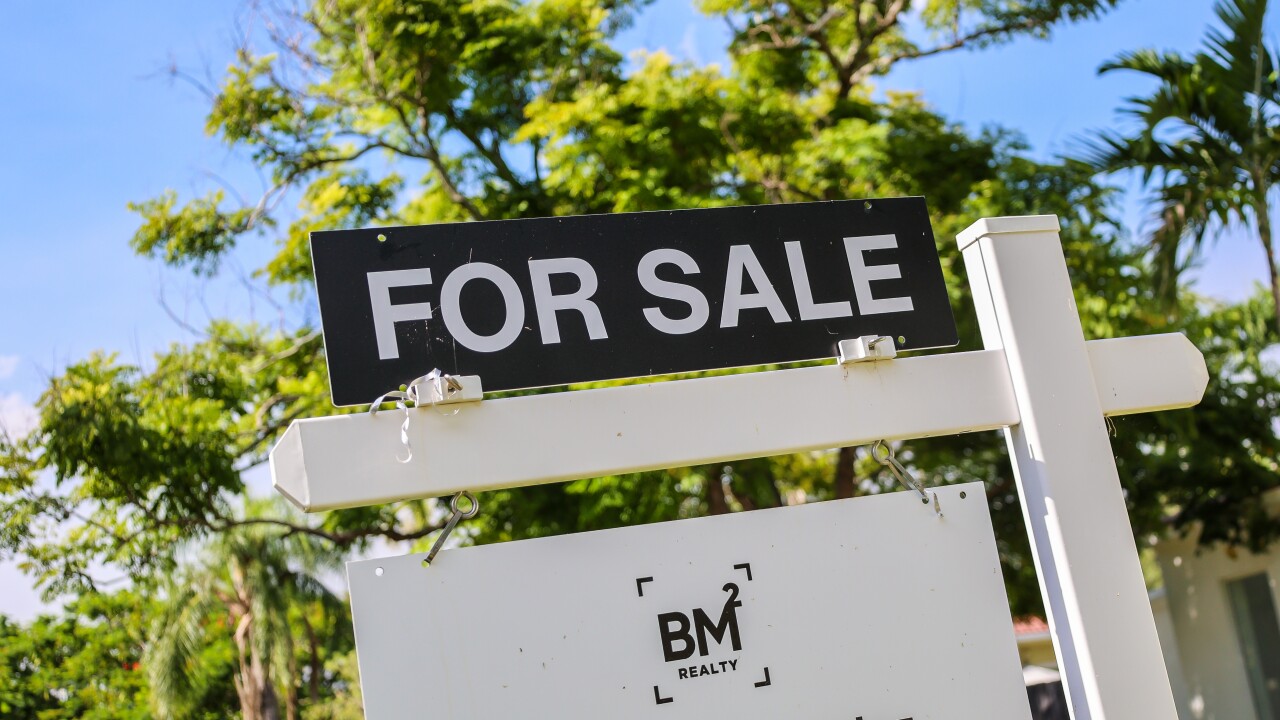A home insurance industry battle in Florida could lead to collateral damage for the state's mortgage industry at a sensitive time.
Financial ratings firm Demotech downgraded the financial stability rating of three homeowner insurers in the past few weeks, and warned 17 other insurers of potential future downgrades. Any rating below "A" would disqualify the insurers from compliance with
Florida officials are touting a temporary fix they say will keep downgraded insurers compliant with the government-sponsored entities' requirements. While state officials fret over the timing of downgrades amid hurricane season, some insurance and mortgage leaders are wary of the possibility that the GSEs will not accept the solution.
"It would be a nightmare for lenders because essentially, all of those downgraded insurance companies would be ineligible for most traditional lending," said Mike Pearson, senior vice president and national sales manager of GoPointDirect, the wholesale channel of Point Mortgage.
Pearson is also a chapter president, state director and communications and technology committee chair for the Florida Association of Mortgage Professionals, one of the few mortgage organizations calling attention to the state's home insurance situation.
Those watching the issue now anxiously await word from the GSEs on whether they'll accept Florida officials'
Florida's Office of Insurance Regulation [OIR] and the Mortgage Bankers Association of Florida said they're confident the arrangement will satisfy GSE underwriting requirements, but other experts aren't as optimistic.
"It wouldn't surprise me if they rejected this proposal from the state," said Mark Friedlander, director of corporate communications at the Insurance Information Institute. "In the past, they've been pretty clear that they were not going to bend."
Representatives for both Fannie Mae and Freddie Mac didn't respond to repeated requests for comment. Other state and national mortgage organizations and lenders either declined to speak on the issue or did not respond to requests for comment.
The issue arose last month when Demotech sent letters to 17 homeowners insurers suggesting it would downgrade their ratings July 26, two months into hurricane season, which runs between June and November. Demotech suggested insurers needed to shore up their balance sheets.
Their losses aren't coming from hurricanes and other climate-related disasters — the state has been spared from major storm damage in the past three years. It's rampant homeowner claim litigation that's draining the now downgraded companies.
Despite accounting for just 7% of homeowners insurance claims in 2021, Floridians were responsible for 76% of homeowners insurance-related lawsuits in 2021, according to
Experts point to roofing scams in which contractors, under the guise of fixing allegedly battered roofs, get policyholders to sign over their right to collect claim payments from insurers and file lawsuits, according to the Insurance Information Institute. Florida allows a "fee multiplier" for plaintiffs' attorneys to
Net underwriting losses for Florida insurers exceed $1 billion in 2020 and 2021, according to the Insurance Information Institute. Florida homeowners are feeling the pain, paying the highest average property insurance premium in the country at $4,231, approximately three times the national average, the Insurance Information Institute found.
The Florida Senate in May passed a bill to
"The state has worked hard to put measures in place to help correct some of these issues," Pearson said. "And now it's almost like the carpet has been pulled out from under them as we finally addressed these issues."
Homeowner impact
It's unclear how many homeowners are at risk because of the downgrades; Weston had 22,000 policies at the end of June, according to media reports, while UPC and FedNat's numbers are undisclosed. The insurers didn't respond to requests for comment, while UPC made only brief mention of the downgrade in a Monday second quarter earnings call.
UPC as of early August was the sole insurer to participate in the Florida OIR's Temporary Arrangement. The
Citizens, which
The OIR earlier this week said it's confident the temporary arrangement, which expires June 1, 2023, qualifies for the exceptions.
Both insurance and mortgage leaders have mixed expectations for the GSE's response to the program. Kyle Urich, president and CEO of the Florida Association of Insurance Agents, in late July slammed Demotech's actions as an attempt to get the GSEs to acquiesce to ratings below "A"; he's since issued a wait-and-see approach.
Doug Leever, vice president of sales at lender We Florida Financial and president of the Mortgage Bankers Association of Florida, acknowledged the organization is concerned about the downgrades.
"We fully believe that Fannie and Freddie will continue to work with the Florida lenders and the Florida Legislators on assisting customers of Florida with purchasing and refinancing properties in Florida and their ability to acquire adequate insurance coverage on those properties," he said in a statement Thursday.
Meanwhile, other parties are trying to call attention to the issue. U.S. Sen. Marco Rubio, a Republican from Florida,
Prospective homebuyers will continue to see homeowners insurance options dwindle and policy pricing climb, Pearson said. He's already lost two insurers on his North Palm Beach residence, he said, and now relies on Citizens' windstorm coverage in the event of a disaster.
"I think there are a lot of people that haven't heard the message," he said. "If this plan doesn't take place, I don't think they grasp what that would do."




